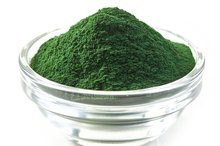What does fact checked mean?
At Healthfully, we strive to deliver objective content that is accurate and up-to-date. Our team periodically reviews articles in order to ensure content quality. The sources cited below consist of evidence from peer-reviewed journals, prominent medical organizations, academic associations, and government data.
The information contained on this site is for informational purposes only, and should not be used as a substitute for the advice of a professional health care provider. Please check with the appropriate physician regarding health questions and concerns. Although we strive to deliver accurate and up-to-date information, no guarantee to that effect is made.
Can Spirulina Replace Multivitamins?
Spirulina, a type of blue-green algae, contain a number of nutrients, including fiber, protein, the essential fatty acid gamma-linolenic acid, iron, B vitamins, vitamin E, copper, zinc, manganese, beta carotene and selenium 2. While research is still very preliminary, spirulina supplements may also provide a number of health benefits. However, you may be better off with a multivitamin for meeting your daily vitamin and mineral needs.
Multivitamins
Multivitamins usually contain most or all of the vitamins and minerals for which there is an RDA, or recommended dietary allowance. Some multivitamins also contain other ingredients, but these are not necessary and may not be helpful. Stick with vitamins that contain 100 percent or less of the daily value for each ingredient and have the USP, or United States Pharmacopeia, seal on the label.
Spirulina vs. Multivitamins
Spirulina Side Effects
Learn More
Spirulina supplements will not contain as many different vitamins and minerals as most multivitamins, and they aren't formulated to have an optimal amount of each vitamin and mineral so they may not consistently contain the same amounts of vitamins and minerals. Multivitamins with the USP symbol are also free of contaminants, which may not be true in the case of spirulina supplements.
Spirulina Risks
Only choose spiralina supplements from a trusted manufacturer, as blue-green algae like spirulina sometimes contain substances called microcystins that are toxic and may be concentrated sources of heavy metals, including lead, if these were present in the water where the spirulina was harvested 2. Spirulina may also be contaminated with bacteria. You shouldn't take spirulina supplements if you are pregnant, suffer from an auto immune disease or PKU or take medications that suppress the immune system.
Considerations
Vitamin D2 Dangers
Learn More
Although many people take multivitamins as an insurance policy to make sure they meet the recommended intakes for these vitamins and minerals, most people don't actually need to take either multivitamins or spirulina. Multivitamins are most important if you are pregnant or may become pregnant, if you do not spend much time in the sun or if you are elderly, as calcium and vitamin D may lower your risk for osteoporosis and a combination of other vitamins and minerals may lower your risk for macular degeneration.
Related Articles
References
- University of Maryland Medical Center: Spirulina
- Medline Plus: Blue-green Algae
- The Washington Post: Panel Finds Conflicting Data on Multivitamin Benefit
- Cooking Light: Choosing a Multivitamin
- Park HJ, Lee YJ, Ryu HK, Kim MH, Chung HW, Kim WY. A randomized double-blind, placebo-controlled study to establish the effects of spirulina in elderly Koreans. Ann Nutr Metab. 2008;52(4):322-8. doi:10.1159/000151486
- Man LX. Complementary and alternative medicine for allergic rhinitis. Curr Opin Otolaryngol Head Neck Surg. 2009 17(3):226-31. doi:10.1097/MOO.0b013e3283295791
- Cingi C, Conk-Dalay M, Cakli H, Bal C. The effects of spirulina on allergic rhinitis. Eur Arch Otorhinolaryngol. 2008 265(10):1219-23. doi:10.1007/s00405-008-0642-8
- Lee EH, Park JE, Choi YJ, Huh KB, Kim WY. A randomized study to establish the effects of spirulina in type 2 diabetes mellitus patients. Nutr Res Pract. 2008 2(4):295-300. doi:10.4162/nrp.2008.2.4.295
- Mani UV, Desai S, Iyer U. Studies on the Long-Term Effect of Spirulina Supplementation on Serum Lipid Profile and Glycated Proteins in NIDDM Patients. Journal of Nutraceuticals, Functional & Medical Foods, 2000;2:3, 25-32. doi:10.1300/J133v02n03_03
- Mathew B, Sankaranarayanan R, Nair PP, et al. Evaluation of chemoprevention of oral cancer with Spirulina fusiformis. Nutr Cancer. 1995;24(2):197-202. doi:10.1080/01635589509514407
- Torres-duran PV, Ferreira-hermosillo A, Juarez-oropeza MA. Antihyperlipemic and antihypertensive effects of Spirulina maxima in an open sample of Mexican population: a preliminary report. Lipids Health Dis. 2007;6:33. doi:10.1186/1476-511X-6-33
- U. V. Mani, S. Desai & U. Iyer (2000) Studies on the Long-Term Effect of Spirulina Supplementation on Serum Lipid Profile and Glycated Proteins in NIDDM Patients. Journal of Nutraceuticals, Functional & Medical Foods, 2:3, 25-32. doi:10.1300/J133v02n03_03
- Miczke A, Szulińska M, Hansdorfer-Korzon R, et al. Effects of spirulina consumption on body weight, blood pressure, and endothelial function in overweight hypertensive Caucasians: a double-blind, placebo-controlled, randomized trial. Eur Rev Med Pharmacol Sci. 2016;20(1):150-6.
Writer Bio
Based in Massachusetts, Jessica Bruso has been writing since 2008. She holds a master of science degree in food policy and applied nutrition and a bachelor of arts degree in international relations, both from Tufts University.









